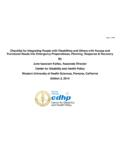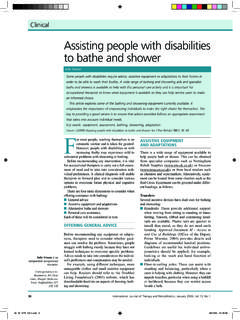Transcription of Personal Independence Payment: Factsheet for …
1 National AIDS Trust, PIP, August 2015. Personal Independence Payment: Factsheet for people living with HIV. Summary Personal Independence Payment or PIP for short - is a benefit which is designed to help people with disabilities and long-term health conditions lead independent and active lives. PIP is there to meet the extra costs of living with a disability or long-term health condition, whether or not someone is currently working. It is not an income-replacement benefit. PIP will be replacing another benefit, called Disability living Allowance (DLA). Anyone who currently gets DLA will eventually have to be assessed for PIP, if they still need help with extra costs. (See the final page of this Factsheet for more information on this). What PIP is and isn't PIP is paid to anyone who is found to meet the assessment criteria (see below for details).
2 PIP is available to people who are in work, as well as those who are not in work. PIP isn't means-tested. This means that if you meet the PIP eligibility criteria it doesn't matter if you have other benefits, income or savings you can still claim the benefit. PIP isn't taxed. PIP isn't included in the Benefit Cap1 and if you get PIP, you are exempt from the Benefit Cap. PIP isn't included in Universal Credit2 it is a separate payment. Rates of support PIP has two components: PIP rates - weekly payments Mobility component for help with getting around Mobility Standard Rate = Daily living component for help doing everyday activities Mobility Enhanced Rate = Someone may be eligible for one or both components. Daily living Standard Rate = Daily living Enhanced Rate = Each component is available at a standard' or enhanced' rate.
3 The rate that someone may get will depend on the severity of the at 6 April 2015. barriers they face, as identified by the assessment. 1. For more information on the Benefit Cap 2. For more information on Universal Credit National AIDS Trust, PIP, August 2015. Length of PIP award Most PIP awards will be for a specific number of years. Shorter-term awards will last up to two years. Longer- term awards will last between five and ten years. A small number of people will get ongoing awards' which do not have a fixed end date. Towards the end of your fixed-period award, you will be invited' by the Department for Work and Pensions (DWP) to re-apply for PIP. Your fixed-period PIP award will not be automatically renewed when it comes to an end you will need to make a fresh application for PIP before your award runs out, or you could lose your DLA benefit.
4 In addition, the DWP may in some cases get in touch with you before the end-date of your fixed-period award (or at any point during an ongoing award) to check that your circumstances are still the same. If this happens, the DWP will send you another PIP form which you will need to fill out. PIP assessment process The PIP assessment has the following stages: 1. You phone the Department of Work and Pensions PIP new claims line on 0800 917 2222 (Monday to Friday, 8am to 6pm). 2. The DWP sends you a form (PIP 2 How your disability affects you') which you need to fill in and re turn within one month. 3. You provide additional evidence from people involved in your care ( doctor's note) as soon as possible (ideally with your PIP 2 form). 4. The DWP sends this information to a healthcare professional employed by Atos or Capita.
5 5. The Atos or Capitalhealthcare professional will arrange for you to come for a face-to-face interview (in most cases). 6. The DWP makes a decision on your claim, based on the assessment which the Atos or Capita health care professional has made. 7. The DWP tells you whether you are going to get PIP. 8. You can ask for DWP to reconsider of your claim (if you disagree with the decision). 9. You can make an appeal to an independent tribual (if you disagree with the reconsideration). Face-to-face assessment The face-to-face part of the assessment will be carried out by a healthcare professional working for either Atos or Capita (the Government-appointed assessment providers) depending on where in the country you live. You can request an assessment in your home or at a local centre, depending on your health needs.
6 The assessment will ask about your ability to carry out twelve key daily activities (such as food preparation and getting dressed in the morning) as a measure of the barriers that you may face in your day-to-day life. The format of the assessment questions is quite similar to the Work Capability Assessment (WCA), which is used to assess claimants for Employment and Support Allowance. 2. National AIDS Trust, PIP, August 2015. After carrying out the assessment and considering any other evidence you have provided, the Atos or Capita healthcare professional will submit their findings and recommendations to the DWP, who make the decision about whether or not you are eligible for a PIP award. PIP roll-out process if you don't currently get DLA. Anyone who needs help with paying for the extra daily living and mobility costs associated with living with a disability or long-term health condition who doesn't already get DLA can make an application for PIP at any point.
7 PIP roll-out process if you are getting DLA now If you already get DLA, you do not need to do anything until you are contacted by the DWP with an invitation'. to claim for PIP. If you do not accept this invitation and apply for PIP than you may lose your DLA benefit. There is no automatic transfer from DLA to PIP. You may be invited to claim PIP if you are in the following categories: You have a fixed-period DLA award which is due to end soon. You have reported a change in your condition or circumstances which could affect your DLA claim. You have been claiming DLA as a child and will soon by turning 16. In addition, from July 2015 onwards some people on long-term and indefinite DLA awards will start being invit- ed to apply for PIP. This final roll-out will be done gradually over a period of two years, by postcode areas.
8 The first postcode areas to be affected are: BB, BL, DE, LE, M, OL, PR, ST, WA and WN (from July); CO, L, and NR (from August). The DWP plans to complete the roll out by late 2017. Further sources of advice and help Providing evidence for your benefits application: A guide for people living with HIV. Developed by NAT and NHIVNA (the national HIV nurses association). DWP guide to claiming PIP Life with HIV has resources for people living with HIV and is home to NAT's HIV Activists network which campaigns on benefits issues. THT Direct (free call 0808 802 1221). Disability Rights UK for more detailed information on PIP. CAB Advice Guide A self-help guide by Citizen's Advice Tcell is a website run by and for people with HIV, with a lot of benefits-related information and tips and interactive forums.
9 Always check that any information you are using is up to date as the benefits system is going through a rapid period of change. Tell us what you think: We are always keen to hear from people living with HIV email with feedback on this Factsheet or to telll us your experience of applying for PIP. 3.






